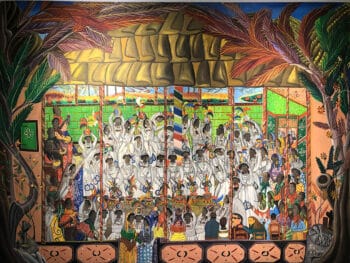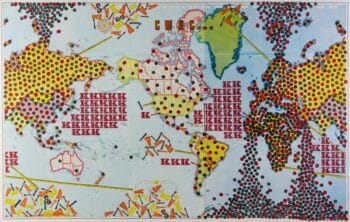Dear friends,
Greetings from the desk of Tricontinental: Institute for Social Research.
At the close of the May 2023 Group of Seven (G7) summit in Hiroshima (Japan), the foreign ministers of Canada, France, Germany, Italy, Japan, the United Kingdom, and the United States and the High Representative of the European Union (EU) released a long and informative statement. In a section titled ‘China’, the eight officials wrote that they ‘recognise the importance of engaging candidly with and expressing our concerns directly to China’ and that they ‘acknowledge the need to work together with China on global challenges as well as areas of common interest, including on climate change, biodiversity, global health security, and gender equality’. The diplomatic tone of the statement stands out in comparison to the heated rhetoric that these countries have adopted in recent years and is much softer than the language used at the G7 meeting itself, where the heads of government bandied about the phrase ‘economic coercion’, indirectly aimed at China.
A close reading of the speeches at the meeting suggests that there are differences of opinion amongst the leaders of the G7 countries, particularly when it comes to China and their own domestic industrial policies. Certainly, several European states are uneasy about the domestic economic consequences of prolonging the war in Ukraine and of a possible military conflict over Taiwan. It is perhaps this uneasiness that prompted U.S. President Joe Biden to say, ‘We’re not looking to decouple from China, we’re looking to de-risk and diversify our relationship with China’.
For Europe, the notion of decoupling from China is inconceivable. In 2022, EU figures show that China was the third largest partner for goods exported from the region and the largest partner for goods imported to the region, with most of the goods imported by China being high-end, value-added manufactured goods. Europe’s domestic economies have already been grievously injured by the West’s refusal to negotiate a peace agreement in Ukraine; being cut-off from the burgeoning Chinese market would be a fatal blow.
The G7 meeting reveals the gaps between the United States and its allies (Europe and Japan), but these differences of interest and opinion should not be overestimated. As part of our work at Tricontinental: Institute for Social Research, we have been researching and analysing the nature of the cooperation between the United States, Europe, and Japan—the ‘Triad’, as Samir Amin called them; while our research is still ongoing, we present some of the data in this newsletter.
Following the end of the Second World War, the United States built an international system that was premised on the subordination and integration of Japan and Europe. This process of subordination and integration was evident in the military apparatus constructed by the United States, with the North Atlantic Treaty Organisation (NATO) established in 1949 and U.S.-Japan Security Treaty of 1951 being the lynchpins. Establishing a system of U.S. military bases in the defeated powers—Germany, Italy, and Japan—allowed Washington to set aside any talk of a sovereign military or diplomatic project for either Europe or Japan (tantrums from France, inspired by Charles De Gaulle’s grand sense of French destiny, led not to a withdrawal from NATO but only to a removal of French forces from the alliance’s military command in 1966).
There are currently 408 known U.S. military bases in the Five Eyes countries (Australia, Canada, New Zealand, the United Kingdom, and—because they share intelligence with each other—Israel), in Europe, and in Japan. Stunningly, Japan alone has 120 U.S. military bases, while Germany hosts 119 of them. It is important to understand that these bases are not merely instruments military power, but also political power. In 1965, Thomas Hughes of the U.S. State Department’s Bureau of Intelligence and Research authored an important memorandum, ‘The Significance of NATO—Present and Future’. NATO, Hughes wrote, ‘remains essential to the U.S. as a well-established and easily available instrument for exercising American political influence in Europe’ and ultimately ‘it is important for the protection of American interests in Europe’. Such a system had already been put in place in Japan, as detailed in this U.S. military memorandum from 1962. The network of U.S. military bases in Europe and Japan are the symbol of their political subordination to Washington.

Yinka Shonibare (Nigeria), Scramble for Africa, 2003.
With the signing of the U.S.-Japan Security Treaty in 1951, Japan’s Prime Minister Shigeru Yoshida accepted the dominance of the U.S. military over his country but hoped that the Japanese state would be able to focus on economic development. Similar doctrines were articulated in Europe.
In the post-war era, an economic bloc began to form between the United States, Europe, and Japan. In 1966, Raymond Vernon published a significant journal article, ‘International Investment and International Trade in the Product Cycle’, in the Quarterly Journal of Economics in which he showed how the large international corporations built a sequential structure: goods would be first produced and sold in the United States, then in Europe, and afterwards in Japan, after which they would finally be sold in other parts of the world. In 1985, Kenichi Ohmae, managing director of the global consulting firm McKinsey’s Tokyo office, shed further light on this arrangement in his book Triad Power: The Coming Shape of Global Competition. Ohmae illustrated how international corporations had to operate simultaneously in the United States, Western Europe, and Japan; increasing capital intensity, high research and development costs, a convergence of consumer taste, and the rise of protectionism made it essential for international corporations to work in these countries, which Ohmae collectively called the Triad, and then seek markets and opportunities elsewhere (where seven-tenths of the world lived).

André Pierre (Haiti), Ceremony with Issa and Suz, ca. late 1960s/early 1970s.
Samir Amin used that term—Triad—for a very different purpose. In 1980, he wrote of the ‘gradual consolidation of the central zone of the world capitalist system (Europe, North America, Japan, Australia)’, and soon thereafter began to refer to this ‘central zone’ as the Triad. The elites in Europe and Japan subordinated their own national self-interest to what the U.S. government had begun to call their ‘common interests’. New institutions and terms emerged in the 1970s, giving shape to these ‘common interests’, including the Trilateral Commission (set up by David Rockefeller in 1973 with headquarters in Paris, Tokyo, and Washington) and the concept of ‘trilateral diplomacy’ (which brought together Western Europe, Japan, and the United States under one unified diplomatic worldview).
Intellectuals in these trilateral circles saw the United States as the central power with its vassal states (Europe and Japan) empowered to maintain control over the tributary states (such as South Korea) in order to keep the rest of the world stable. Much harsher language was used by Zbigniew Brzezinski, one of the architects of the Trilateral Commission and National Security Advisor to U.S. President Jimmy Carter. In The Grand Chessboard: American Primacy and Its Geostrategic Imperatives (1997), Brzezinski wrote, ‘To put it in terminology that hearkens back to the more brutal age of ancient empires, the three grand imperatives of imperial geostrategy are to prevent collusion and maintain security dependence among the vassals, to keep tributaries pliant and protected, and to keep the barbarians from coming together’. You can guess who the barbarians are in Brzezinski’s imagination.
In recent years, the concept of the Triad has largely fallen out of favour. But there is a need to recover this term to better understand the actual world order. The imperialist camp is not solely geographically defined; both the older term, Triad, and the more currently used term, Global North, are geopolitical concepts. The majority of the world—the Global South—now faces a U.S.-led and dominated imperialist system that is rooted in an integrated military structure. This system is composed of three groups: (1) the United States, the United Kingdom, and other Anglo-American white settler states; (2) Europe; and (3) Japan. The Global North is home to a minority of the world’s population (14.2%) but is responsible for a clear majority of global military spending (66.0%). According to the Stockholm International Peace Research Institute, total world military spending reached $2.2 trillion in 2022, with the Triad and its close partners responsible for $1.46 trillion of that amount (China’s military spending is $292 billion, while Russia spends $86 billion). It is this immense military power that allows the Triad to continue to assert itself over the world’s peoples, despite its weakening hold on the world economy.

Dan Mills (USA), Current Wars & Conflicts… (with, by continent, Belligerent and Supporter groups marked with black and red circles respectively, and Asylum Seekers, Internally Displaced, Refugees, and Stateless marked with a letter for every million, and killed marked with a letter for every 250k), 2017.
In recent years, the United States has encouraged a Japanese rearmament and a German military build-up, both of which were discouraged after the Second World War, so that these ‘vassals’ can strengthen Washington’s parochial New Cold War against Russia and China as well as the newly assertive states of the Global South. Although some elites in Europe and Japan are able to see the domestic crises in their countries that are being accelerated by the U.S. foreign policy agenda, they lack the cultural and political confidence to stand on their own two feet.
In 2016, the European Union’s High Representative Federica Mogherini laid out the concept of Europe’s ‘strategic autonomy’ from the United States in the EU Global Strategy. Three years later, France’s Emmanuel Macron said that NATO was suffering ‘brain death’ and that ‘Europe has the capacity to defend itself’. Today, it is clear that neither assertion—Europe’s strategic autonomy nor its capacity to defend itself—holds any water. Modest returns of Gaullism in France do not offer the kind of courage required by European and Japanese leaders to break with the trilateral bargains that were set up seventy-eight years ago. Until that courage arrives, Europe and Japan will remain entrenched in their conditions of vassalage, and the Triad will remain alive and well.
Warmly,
Vijay

